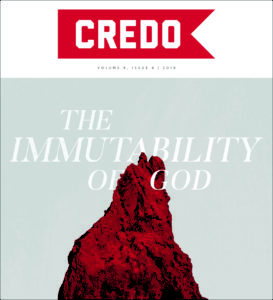The doctrine of divine immutability, like all the incommunicable attributes, is very susceptible to vaporizing into the mists of abstraction. From there, it takes to wandering in aimless speculation seeking rest, finding none. The magisterial Reformers were particularly suspicious of such speculation with no obvious home address in Scripture. I’ve read, though I can’t remember where (write me if you know), that Calvin’s favorite passage was Deuteronomy 29:29, “The secret things belong to the Lord or God, but the things revealed belong to us… that we may do all the words of this law.” If not his favorite, it seems an apt manifesto of Calvin’s theological priorities, not least for the Puritans who insisted on the practical “use” of doctrine.
To be sure, even doctrine in its gaseous state has its “uses.” It has a place in the weather cycle of worship, a cycle God himself sets in motion with invitations to and glimpses of his glory. It’s a cycle that rises in awe, then falls back intellectually repelled and spiritually humbled by the majesty of God. With David we must eventually confess, “I do not occupy myself with things too great and marvelous for me.” Like Moses in his solar eclipse encounter with God’s glory, all we can do is “bow to the ground and worship.”
We cannot remain in the luminous ether of God’s infinite plentitude, but we don’t need to because in the revelation of Jesus Christ all the fullness of God is pleased to dwell. When no one could see God and live, the incarnate Son made God known. Christ makes all the theological abstractions concrete; he brings all the prodigal speculations back home. And that includes the doctrine of divine immutability which, like its incommunicable brothers, is prone to wander. Christ makes all the theological abstractions concrete; he brings all the prodigal speculations back home. Click To Tweet
For this high and lofty doctrine to have any life-giving impact in our daily struggles and joys, it must be transposed through the words of Christ and metabolized in the work of Christ. What, then, does this doctrine look like when condensed into a solid state? When it begins to take on a recognizable shape and face? I think it looks like Hebrews 13:8, “Jesus Christ is the same yesterday, today, and forever.”
Hebrews 13:8 is a remarkably pithy statement, a rallying cry suited for any present contingency, any past regret, any future apprehension. It is particularly noteworthy in the context of the paragraph and letter in which it is found. It comes at the end of a list of pastoral and neighborly exhortations starting off with the general, umbrella exhortation, “let brotherly love continue,” and proceeding to hospitality, visitation, empathy, commitment within marriage, financial contentment, and respect.
The Immutability of Christ
What is apparent from the first eight verses is that all these “rubber-hits-the -road” types of application are rooted in the motto of v. 8. Otherwise, why would the author throw this christological declaration in the middle of all these ethical instructions? But what, exactly, is the connection?
The connection, I believe, is not to the metaphysical immutability of Christ’s nature but the incarnational immutability of Christ’s will. Christ was unwavering in his commitment to obey his Father and serve his brothers. Therefore, “let brotherly love continue.” One could look at all the exhortations in v. 1–7 through the lens of faithful, consistent engagement despite inconvenience and the temptation to short-cuts. The concluding exhortation in v. 7 encourages us to follow the consistent lifestyle of those who have persevered and run their race well. But of course, the supreme model of that well-run race is Jesus himself, the “author and finisher of our faith.”
Already we’ve made a few nods to the larger themes of Hebrews. To cement further the relationship forged in ch. 13 between ministry and immutability, we need to give those larger themes our full attention. In one way or another, Christ’s unchangeable resolve drives the argument of the book. Some highlights include 5:8–9, “although being a Son he learned obedience through what he suffered, being made perfect.” The idea behind this rather shocking language is Christ’s unconquerable resolve to overcome every opposition, every tribulation so as to prove what he already was—worthy and capable to save his people to the uttermost.
It is Christ’s unshakable will that the author features to distinguish the efficacy of the NT cross from the inefficiency of the OT altar (10:8–9). His decision to love God and his neighbor held true even when he came under the wrath of God and the hate of the world. Christ remained the same when everything around him screamed, “Give in! Compromise! Walk away!”
Does such constancy become predictable? Is such a life of uncompromising engagement and character boring? Hardly. Christ’s immutability translated into his grit in the face of every challenge and every sin in the form of internal temptation or external pressure. A theme front-loaded in Hebrews like no where else is that of Christ’s sinlessness. The doctrine of the impeccability of Christ is actually a riff off that of immutability. Far from being, as it often becomes, a doctrine that exempts Christ from combat with sin, it is precisely what makes Christ exceptional as our savior. It means that Christ stared down the worst that sin had to offer. It means he faced temptations above our pay grade and beyond what we would ever face since we fail too soon to get there.
What makes for boring story-telling is repeated failure with no forward momentum in the plot. For the greatest story ever told, it means that the epic drama of Christ’s life never gets cut short, never ends in tragedy, compromise, or death. It means his story will continue, adding strength to strength, chapter to chapter, through the power, proven time and time again, of his indestructible life. All tragedies meet a final end with the bloodied corpses of all involved upon the floor; but every comedy, of which the gospel is the greatest, leaves the door open to endless sequels.
Plodding faithfulness and unbeclouded character, despite all appearances to the contrary, is the stuff of heroics, as the hall of fame in Hebrews 11 so amply attests. But as every Christian and pastor knows by painful experience, confessing the eternal resolve of Christ does not automatically guarantee even the momentary resolve of our restless hearts. But within Hebrews 13, particularly v. 5-6, we find hope and strength for our weak knees. We have his promise, “I will never leave or forsake you.” Objectively, we trust that Christ our high priest now has the power and justification to wage war with our sins as he intercedes before the throne, pressing home his bloodied conquest, till every enemy to our souls is placed beneath his feet.
The Confidence of Christians
We also have this confidence, “The Lord is my help. I will not fear. What can man do to me?” As Christians and pastors, we can confidently show brotherly affection, hospitality, visit the sick and imprisoned, empathize with those different from ourselves, remain faithful in our marriages, eschew avarice and realpolitik, give honor where honor is due, and risk being burned, snookered, and misunderstood because we are backed by the unshakable, immutable love, word, and work of our faithful savior.
If we want the doctrine of divine immutability to shape our ministries, it must not remain flitting about and floating above us in the trackless currents of idle speculation, nor strike the heart cold as an inert, static eternal mass. Instead, we must allow Scripture to set it to room temperature where it flows as a life-giving liquid poured by the hands and heart of Christ.


